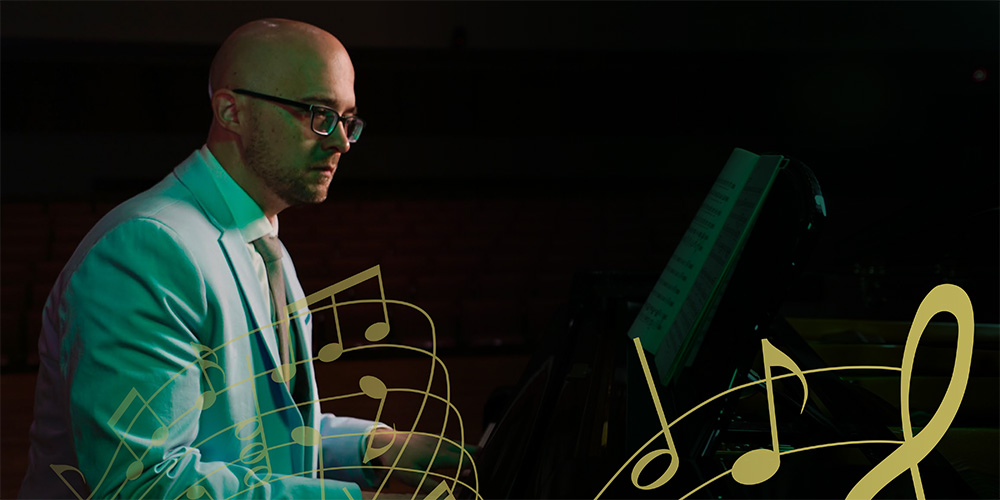
How Does Music Help Us Navigate Our Humanity? Music has historically accompanied major events, both in joy and in sorrow: coronations, weddings, religious ceremonies, festivals, funerals. Whether spiritual or secular, popular or classical, heavenly or heartbreaking, these musical works all share a common trait: Experiencing them takes time.
By Melanie Cost
Dr. Julian Bryson, assistant professor of music and director of choral activities in the Linda Berry Stein College of Fine Arts and Humanities, explains, “Listening to or performing a musical work requires an investment of time, and during that experience we are naturally thinking and reflecting. So, by design, music requires us to spend some time considering an idea.”
That time can be a gift to us, the listeners. In the early 2010s, Dr. Leonid Perlovsky, then at Harvard University, conducted a research study that analyzed student performance during a test. The study demonstrated that if music was playing in the background, students tended to spend more time working through harder questions; if the room was silent, they were more likely to rush through those same questions.
“The suggestion is that music gives us time and an excuse to stay in an awkward or difficult moment a little longer and think more deeply about it,” Bryson concludes.
That artists, both historically and in modern times, have the courage to create meaningful work by voluntarily and repeatedly engaging with those difficult questions is somewhat staggering. A self-selecting group of people choose to dive headfirst into those uncomfortable questions and answers from which most of us remain isolated as we lose ourselves in the minutiae of daily life.
And, as Bryson shares his perspective as a composer, choral director and singer, it is fulfilling for the artists themselves to encourage humanity to ponder these questions. “As musicians, we can raise a controversial subject or difficult question, and rather than immediately launching into an argument about it, we allow listeners to think about it and reflect on it, and then we move on to a different issue.”
Bryson also believes that encountering unfamiliar music — as a performer or listener — is a powerful way to build empathy.
“When we encounter music that is strange or unusual to our ears, there are questions that we can ask, there’s research we can do. If nothing else, we can learn to set aside our own judgment and give it a fair hearing. Curiosity is essential to making sense of music, and those are the same skills that we use when we encounter a person who’s from a culture that we don’t recognize, a political background that we disagree with or a faith that we don’t understand.”
Bryson’s 2018 composition e pluribus unum (Hope Like Gold) does just that, exploring the fleeting nature of hope and its influence on democracy. “Hope is a precious commodity, and once it’s gone, it’s really hard to find again — much like gold and other very valuable substances that we can easily lose or squander. The commentary that I added in the title and the setting of the music is that for me, democracy is hope; the ability to determine the shape of our lives is hope, but it’s also easily lost.”
This composition exemplifies the choices inherent in hope by allowing performers to choose one of two final sounds: one is sung in unison, with each voice performing the same note; the other is a cluster of notes low in the vocalists’ ranges, sounding “muddy and unresolved.” Each time the piece is performed, the singers choose which chord to employ based on what resonates — with their current experience, with the news of the day, with whatever is most meaningful to them. Thus far, performers have always, even in rehearsal, chosen only the discordant cluster chord.
There is a saying within the choral community that if everyone were in a choir, we’d be a much better society. Choral music is by no means a magic wand of homogeneity. On the contrary, musical performance brings together artists with a diversity of experiences and perspectives and allows space for thoughtful contemplation of difficult issues.
“I really see music as a mirror,” Bryson continues. “It shows us another angle or another perspective on the things that are giving us trouble elsewhere in our lives. It also gives us time to process and consider, and I think that’s where hope lives.”
